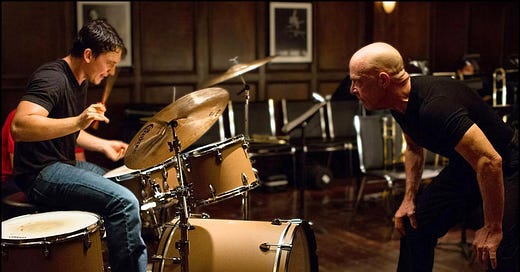The Cost of Greatness
On Damien Chazelle's "Whiplash" and Kazuo Ishiguro's "The Remains of the Day", and what both can tell us about what some will sacrifice to become great.
What do you say to the man who has tortured you mentally and emotionally, and who you have secretly conspired against to make him lose his job, and who has just taken a seat at your table? The man is dressed all in black, his muscles tense, twitching and flexing as if ready to throw a chair at your head (as he once did before). One of you has to speak. Perhaps the question is not what you will say to him, but what will he say to you?
This is the situation young Andrew Neiman (played by Miles Teller) finds himself in near the end of Damien Chazelle’s Whiplash. Across the table is Terence Fletcher (J. K. Simmons), the band leader who screamed at sobbing musicians in his care, and berated a student to the point of suicide. Neiman, having been kicked out of Fletcher’s band for failing to live up to his superhuman standards, has given his testimony to the tribunal leading to Fletcher’s dismissal. The viewer, like Neiman, has no idea whether Fletcher knows that his ex-student played the role…
Keep reading with a 7-day free trial
Subscribe to Volumes. to keep reading this post and get 7 days of free access to the full post archives.





